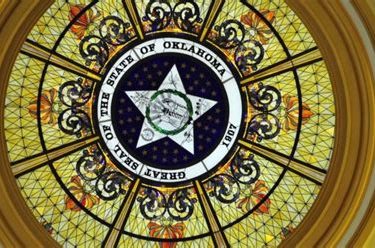Lawmakers Give Details on Redbud School Funding Act
Mike Seals - April 20, 2021 10:52 am

OKLAHOMA CITY – Reps. Kyle Hilbert, R-Bristow; Rhonda Baker, R-Yukon; Mark McBride, R-Moore; Dick Lowe, R-Amber; and Trey Caldwell, R-Lawton, and Sens. Zack Taylor, R-Seminole; and John Michael Montgomery, R-Lawton, issued the following statement today regarding the Redbud School Funding Act, Senate Bill 229:
“This bill fixes funding disparities and ends the uncertainty the Board of Education’s legal settlement created. A majority of school districts will receive more funding under the Redbud School Funding Act without taking funds from one type of school to fund another. While the board’s decision benefited charter schools at the expense of traditional schools, this bill benefits all schools in a constitutional, equitable manner we expect will find broad support. If we want a Top-10 state, it all starts with education. This targeted investment will help push us in that direction.”
Senate Bill 229 has been amended to create the Redbud School Funding Act to address issues related to the Board of Education’s recent legal settlement concerning charter school funding. The amended bill will be heard in the House of Representatives this week.
BACKGROUND
Students in 334 Oklahoma school districts receive below average funding for their education from annual local tax revenue. With the passage of Senate Bill 229, The Redbud School Funding Act, each of those brick and mortar public school in the state will receive a Redbud Grant, giving schools in low property value areas of the state more resources to provide quality education for students.
The State Board of Education brought to the forefront a conversation about funding disparities amongst different types of public schools three weeks ago when they agreed to a settlement with the Oklahoma Public Charter School Association. Their interpretation of existing statute would grant all charter schools access to local property tax dollars that at present, only traditional public schools have the ability to access. If unchanged, their decision would shift tens of millions of local property tax dollars away from traditional public schools and into public charter schools.
On average, public charter schools receive $330 less per student in non-chargeable local revenue because they do not have access to these dollars. (Non-chargeable dollars are dollars that do not count against a school district for the purposes of state aid.) This bill just addresses the discrepancy between County 4-Mill and Building Fund revenue, which all traditional districts are required to receive. It doesn’t include revenue from any bonds a local district passes. Oklahoma charters are not allowed to pass bonds.
However, charter schools are not alone in this funding disparity. Oklahoma’s school funding formula does a great job of providing equity in operating dollars, but it does not provide equity in local resources. Maryetta Public School in Adair County is an example. The school serves 641 students. For every one mill of property taxes levied on local citizens, the school receives $5,821.33, or $9.09 per student per mill. Compare that to Wynnewood Public School in Garvin County, which has 708 students. For every one mill levied in Wynnewood, the school receives $86,536.26 or $122.23 per student per mill.
The State Board’s decision helped bring parity for students enrolled in charter schools, but at the cost of reducing funds to traditional public schools. The Redbud School Funding Act proposes to bring parity without the negative impact to other districts. It will reverse the Board’s decision on allowing charters to receive local tax dollars and instead provide grants to all brick and mortar public schools (traditional and charter alike) that are receiving below average funding for their students by directing a portion of taxes from medical marijuana sales to the Public Common School Building Equalization Fund (PCSBEF). From there, the funding will flow to districts that are below the baseline funding level of $330/student in annual non-chargeable local revenues. The PCSBEF was created by State Question 368 in 1955 and has not been funded for decades, State Question 788 prescribed for the majority of the proceeds of marijuana taxes to go towards education.
The Redbud School Funding Act is a targeted investment of $38.5 million into the lowest funded districts in the state. A baseline of $330 per student may not sound like much, but it’s the difference in a district like Maryretta receiving $34,928 annually in non-chargeable local revenue and $211,910. This targeted investment in Maryetta and 333 other schools across the state will help ensure that all students in Oklahoma have access to the facilities they need to achieve success.



